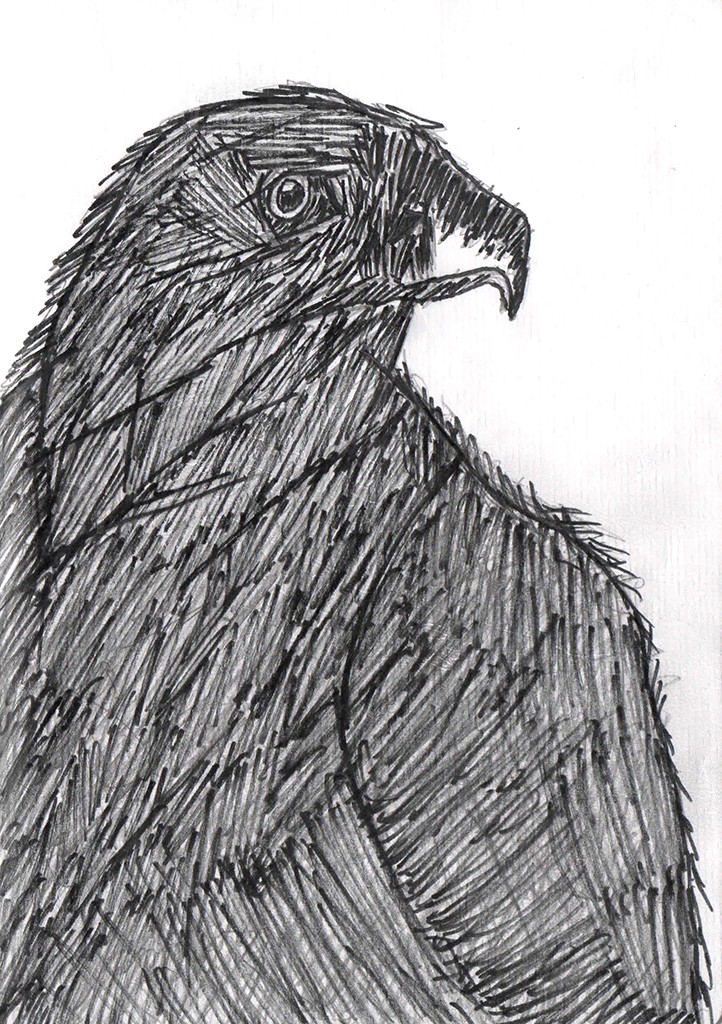One lazy Sunday morning in January, I found myself waking up to a constant tapping on my window. This was certainly an unusual start to the morning, considering that I don’t live on the ground floor, but in the penthouse of a five-storey apartment building (which, happily, comes with a terrace that I can call my own).
My unexpected visitor was Milvus migrans, more commonly known as the Black Kite – an opportunistic hunter that calls the skies of many a city in India home, including Bangalore.
For a big carnivorous bird like the Black Kite to perch upon my windowsill was indeed a novelty – more often than not, the only avians I saw outside my window were a murder of crows. To my mind (and ears), they always seemed to be in the midst of some raucous tribunal, deciding the capital fate of a member of their flock.
Back to Horus – yes, that is what I ended up calling her, for obvious reasons. Horus was the ancient Egyptian god of the sky, hunting and war, always depicted as a falcon. The bird outside my window seemed every bit as majestic and strong.
My windows are tinted, so I’m not sure if her piercing eyes could tell that there was an equally curious creature on the other side of the glass. Still, we sat there sizing each other up, until she suddenly dropped her guard, letting out a shrill scream and spreading her magnificent wings. I didn’t know right away that she was asking for help, rather than proudly displaying her wingspan.
It took me a few moments to realise that she was in pain. It was Makar Sankranti, the day the festival of the sun is celebrated. It’s also the deadliest day of the year for birds. On this day, tens of thousands of “fighter kite” flyers fly their kites, trying their level best to saw off the strings of other kites, with the ultimate aim of being the last one flying in the sky. The nylon strings scissoring the sky are often glass-coated, and kill around a thousand birds every year, though actual numbers could well be higher.
Horus, I’m guessing was one of the thousands of unfortunate birds who got caught in the glass-coated manja of an over-ambitious individual. I saw she had an abrasion across the pectoral muscle of her right wing. Luckily, the wound didn’t seem too deep, and she wasn’t having much trouble flying. What amazed me was that she seemed to be actually asking for help, without any reservations whatsoever. Her willingness to be that accessible and vulnerable made me feel like a bird of quite the same feather (or, if you’re into comics, a combination of Birdman and Dr. Dolittle).
I scurried over to the kitchen sink to fill a bowl of water. I carefully placed it on the sill without making any sudden movements that might scare her away. She drank to her heart's content. Raptors are sharp birds and in this particular instance, Horus proved that she was no exception. She drank from the bowl, and also held a bit of water in her beak to use on her wound. She peered into my room one more time and then flew away. I didn’t think I would see her again.
This is where the story takes a Born Free or Free Willy turn. Three days later, in what felt like freaky déjà vu, Horus beat my alarm by a good hour. Let me tell you, there’s no better wake-up call than a high-pitched screaming raptor right outside your window – no matter how deep a sleeper you are. I instantly knew what she wanted. I filled a bowl with water and placed it next to her. She drank a little bit and flew away, only to return five minutes later with a piece of tissue paper in her beak. I had no idea where she got it from or what she intended to do with it until, like a certain crow who used pebbles to drink water, she dropped the tissue into the bowl. The only conclusion I drew from that one act was that she was smart enough to soak the tissue so she could get a drink of water without having to come back again, at least for some time. I sat there dumbfounded, thinking that the insult “bird brain” was clearly a misnomer.
That wasn’t the last I would see or hear from Horus, either. Incredibly, she visited me on several occasions after that. One time, she even ate out of my hand, which for a bird of prey is highly unusual. On one of those friendly visits she even spread her impressive wings out, all 150 centimetres of them, in a bid to show me how well she had healed. It was a sight I know I won’t forget in a long time.
Every time I think of my encounters with Horus, four months ago now, these thought-provoking words of the famous British veterinary surgeon and writer James Herriot come to mind:
If having a soul means being able to feel love, loyalty and gratitude, then animals are better off than a lot of humans.


